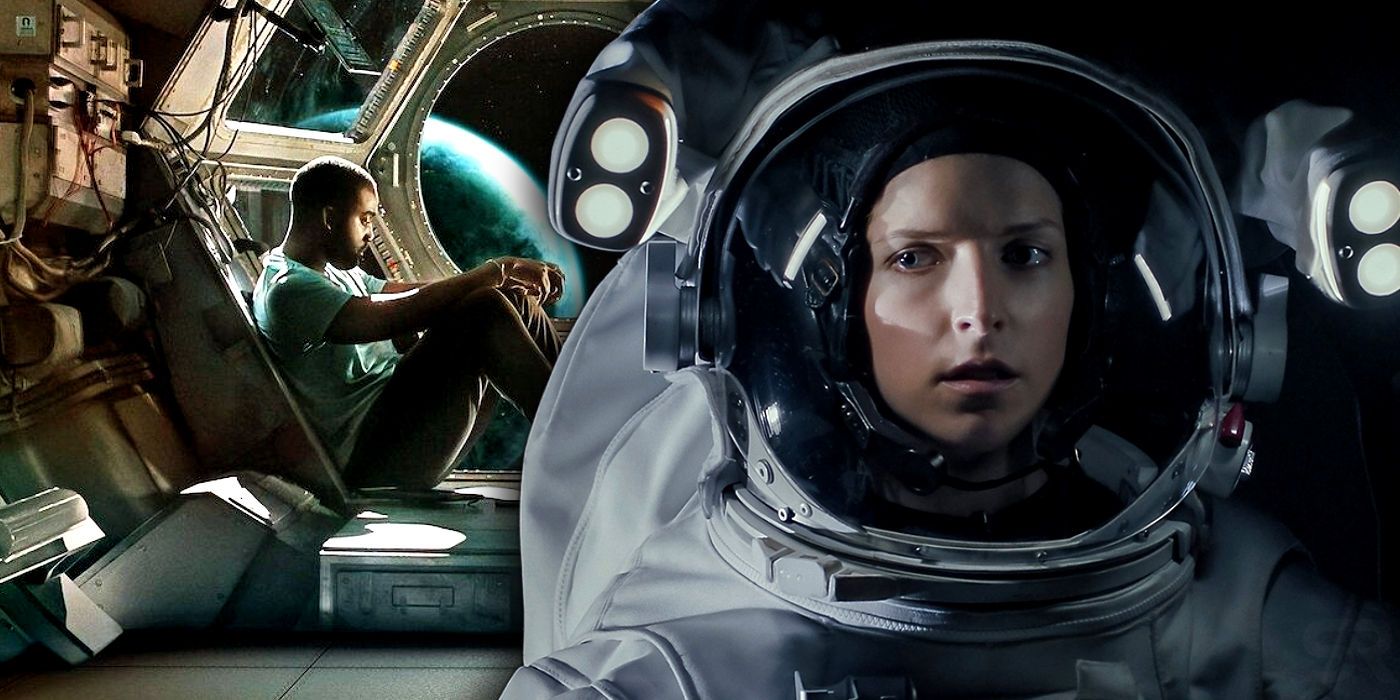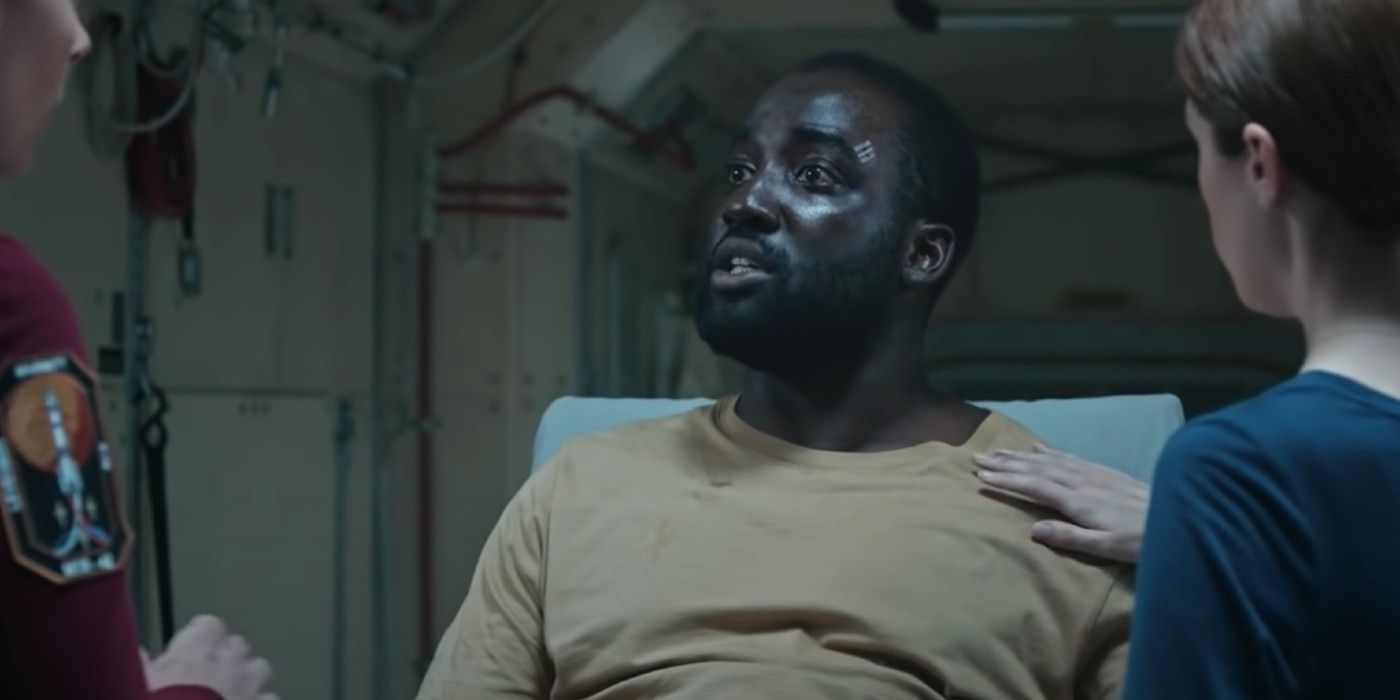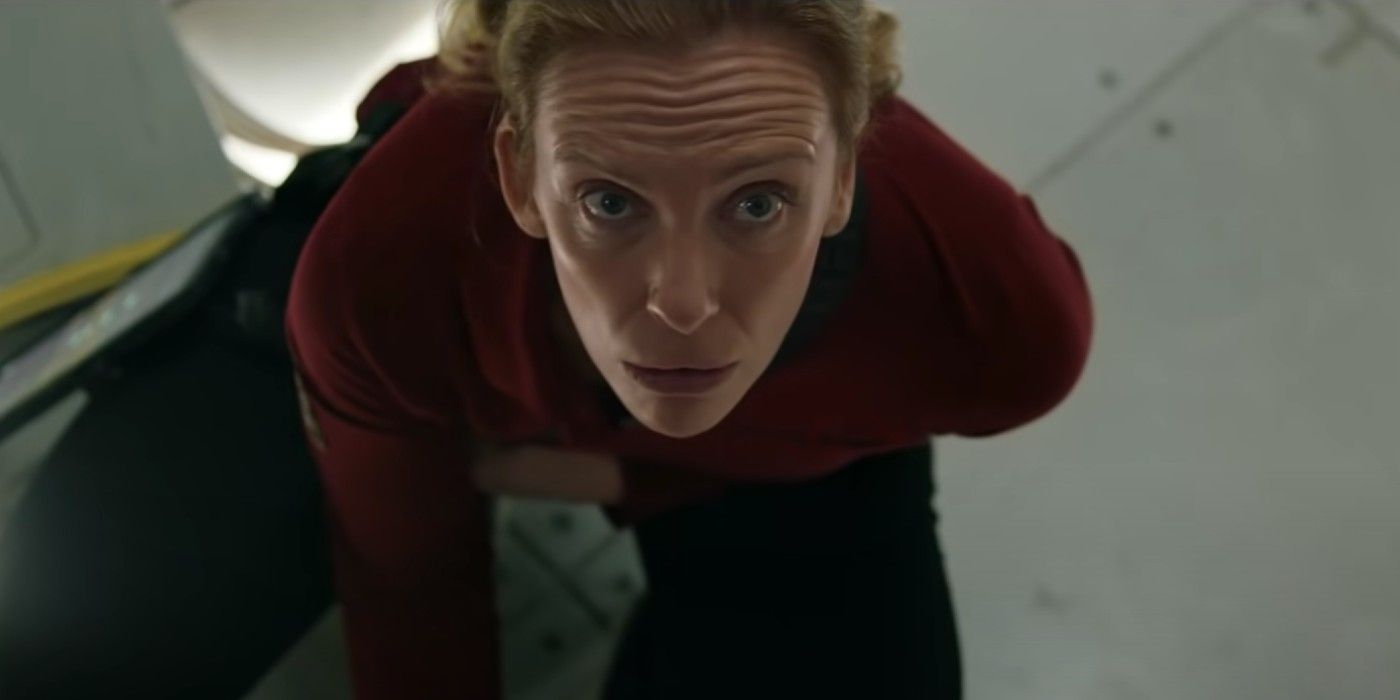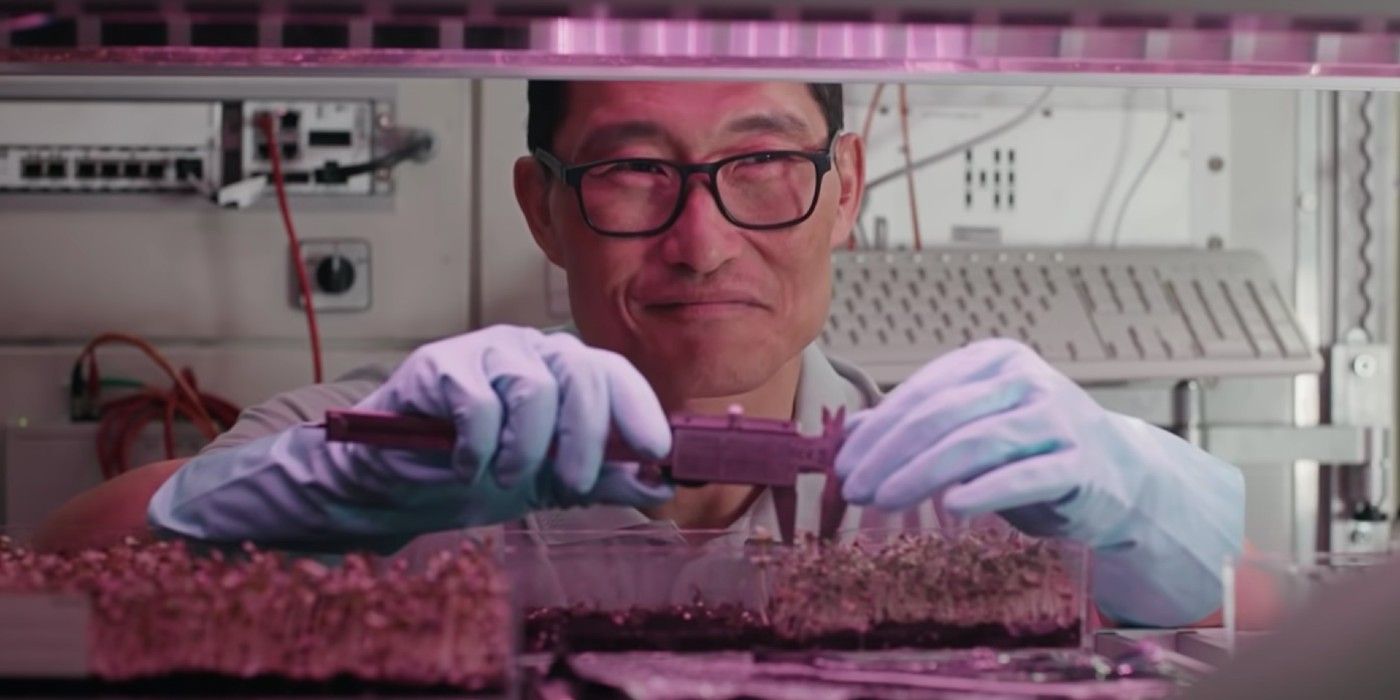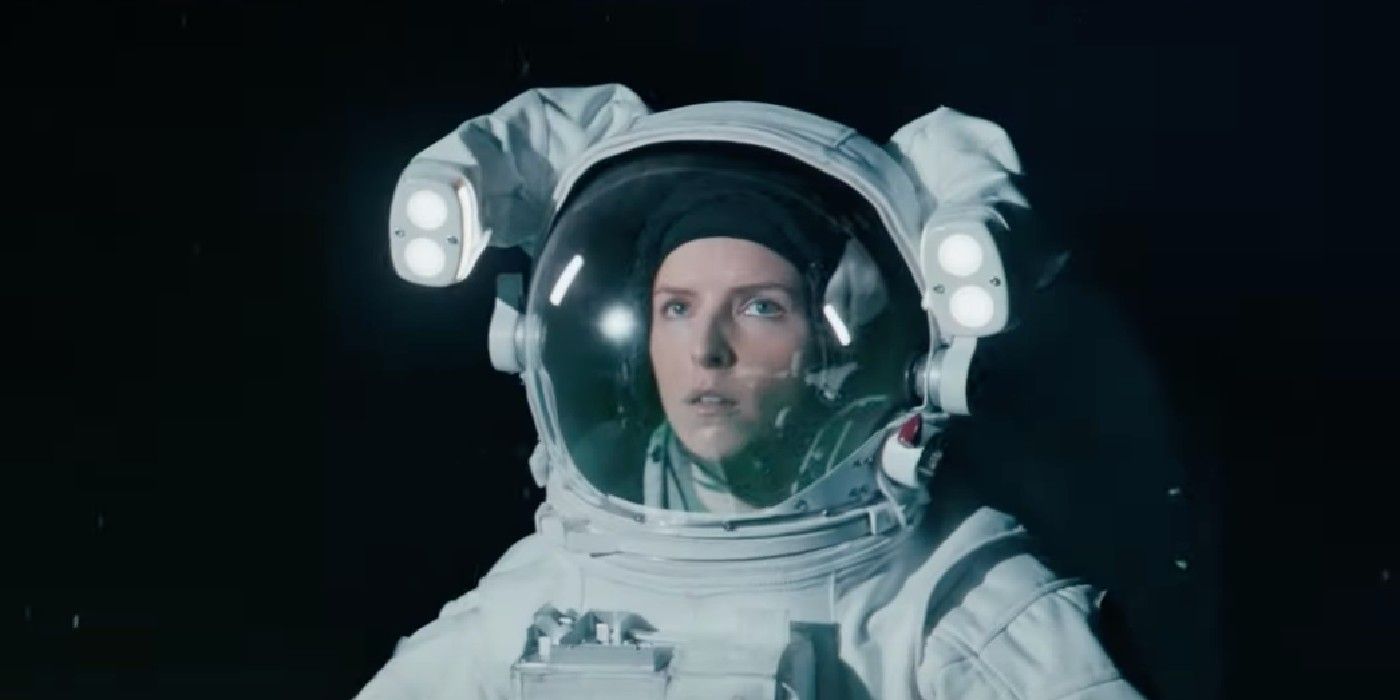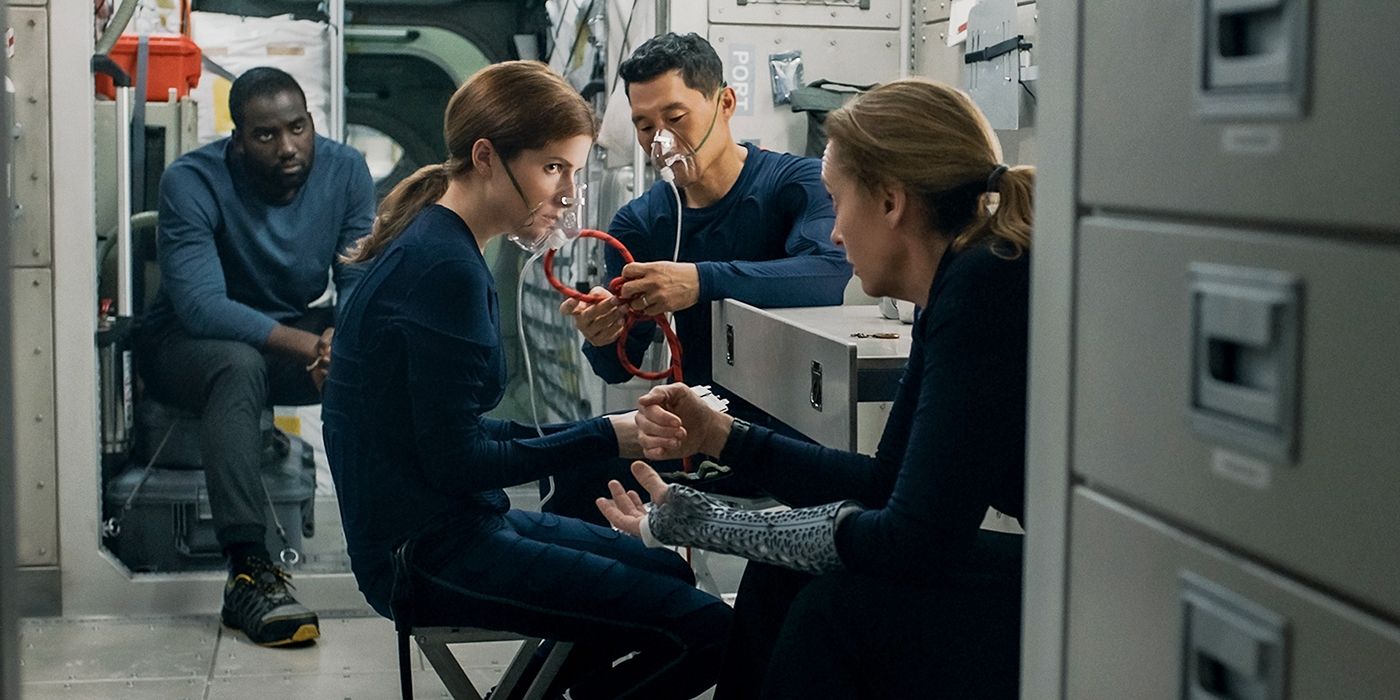Stowaway is a story about a moral quandary that ends with sacrifice. Joe Penna directed the sci-fi thriller, which he co-wrote with Ryan Morrison. The Netflix film stars Toni Collette, Anna Kendrick, Daniel Dae Kim, and Shamier Anderson.
Set in the near future, Stowaway takes place during a time when humans have already started to colonize Mars. After launching into space, three astronauts on a two-year mission to the red planet find an unexpected traveler aboard the ship - an injured launch support engineer who is passed out inside of a ceiling panel housing critical material.
It’s not long before Captain Barnett (Toni Collette) discovers that there is only enough oxygen to sustain three of the four passengers. With no way to turn around, Captain Barnett and biologist David Kim (Daniel Dae Kim) immediately see the stowaway, Michael (Shamier Anderson), as the one who should be sacrificed. But Zoe (Anna Kendrick), a medical researcher and doctor, convinces her fellow crew members to take the time to exhaust all possible options instead. As their time and options run out, Stowaway looks at what happens when the passengers are forced to make an impossible choice - who must die so that the others might live.
How Did The Stowaway Get On Board?
When Captain Barnett finds Michael, two things happen that further serve to create the moral dilemma in Netflix's Stowaway. Barnett opens the compartment and an unconscious Michael comes tumbling out on top of the Captain, breaking Barnett’s arm and damaging the ship’s carbon dioxide removal system in the process. These are two coincidences that ultimately propel the story forward. But audiences will likely be wondering how something like this could happen in the first place. There’s initially a hint of suspense around whether Michael deliberately hid on the ship or if it was truly an accident. One way to heighten the tension would have been to play this out a bit longer and make viewers question Michael’s motives for being on the ship, but that’s not what happens. Based on Michael’s reaction when he wakes up to find that he’s in space, it quickly becomes clear that he isn’t some potentially menacing figure whose goal is to sabotage the mission. After the crew questions him, Michael explains how he somehow fell and was knocked out while securing the launch. Again, Stowaway asks audiences to suspend their disbelief here - imagining the possibility that an engineer would be working alone and that no one on the launch team would miss him before giving the go-ahead for takeoff.
According to Penna, he and Morrison did fact-check their plot to see if this scenario was a real possibility. Penna told Wired that both NASA and private space companies confirmed that this could absolutely happen. But how? There is some brief mention of the ship being quickly redesigned to make room for three people instead of its previous two-person capacity, but Stowaway doesn’t spend a lot of time on an explanation that would make the premise more believable. Instead, it quickly turns toward the story’s moral dilemma.
Stowaway’s Moral Dilemma
If there are four people and only enough resources — in this case, oxygen — for three, then who gets to live in the end; and who decides their fate? This is the ethical predicament faced by the ship’s four passengers in Stowaway. In the film, David and Captain Barrett immediately conclude that their lives are worth more than Michael’s because they are part of the larger mission to Mars and he isn’t. Their reactions are hard to swallow; Zoe is the only one who sees the absurdity in their line of thinking. She manages to hold the others off for a while, but when David is faced with the idea that his life’s work could all be for nothing, he tells Michael the truth. Implying that Michael should take his own life to save the others and giving him the means to do so.
In the end, Zoe saves the day again by telling Michael there’s another way. She finally convinces the Captain and David to risk making a dangerous climb to retrieve any leftover oxygen from their launch, which is housed in another part of the spacecraft hovering high above them. While Zoe’s behavior is admirable, Stowaway ultimately fails to give enough backstory about the mission and its importance — or to develop the characters enough so that the audience fully understands their motivations — to make David and Captain Barrett’s reasoning truly believable. Instead, their reaction and proposed solutions come off as irrational at best and downright callous at worst.
Space Law Connection Explained
The moral dilemma presented in Stowaway hints at the ambiguity of space law compared to the established laws of the sea. In real life, sailors have faced similar situations like the one depicted in Stowaway, creating a precedented response should such an incident arise while at sea. And in some cases, official maritime laws have been established to handle this sort of quandary. Since space travel is a relatively new frontier, especially compared to the centuries of sea travel, such precedents don't always exist when it comes to accidents that occur during space travel.
To avoid arguments over making the kind of complicated choice faced by the crew members in Stowaway, the maritime law of general average seeks to make all parties equal so that everyone aboard shares in any sacrifice resulting from loss or damage to the ship. There are also numerous stories of human sacrifice and cannibalism aboard ships at sea, in which one crew member agrees to give their life to potentially save the others. This is ultimately what happens in Stowaway — minus the cannibalism, of course — but only after the characters have argued over the other possible scenarios raised in the film.
Zoe’s Sacrifice Explained
In the end, Stowaway presents Zoe’s ultimate sacrifice feel like a practical decision more than anything else. Captain Barnett is injured and Michael isn’t trained. This only leaves Zoe or David as an option for retrieving the extra oxygen tank at the other side of the spacecraft. Because Zoe is the most capable climber, the chance of her returning with the oxygen is more likely. It’s possible that Zoe also harbors some guilt for dropping the first oxygen tank that would have made it possible for all four passengers to survive, but seeing as they wouldn’t have gotten it without her in the first place this doesn’t really explain her decision. Essentially, Zoe volunteers because she’s the most capable climber. This, and the fact that David has a family and — as far as audiences know because her backstory is unclear — Zoe doesn’t.
It’s not the most satisfying of explanations, but it also isn’t a surprising one given the little viewers do know about Zoe’s character. Earlier in the sci-fi movies' narrative, Zoe tells Michael a story about a time when she jumped into the ocean to save a man, refusing to let go of him even after he begins pulling her down with him. Zoe does this without knowing whether or not anyone else is coming to their rescue. This anecdote shows the audience that Zoe is the kind of person who is willing to sacrifice herself to save another human being. Even one that she does not know.
By the time Zoe recounts her initial story of heroism to Micheal, she’s already saved his life more than once. First by stitching him up and nursing him back to health, and then again when she convinces the others to let Micheal live. As a doctor, Zoe has also chosen a profession that often involves healing or saving people. Her character is set up as someone with a savior complex from the very beginning, so it’s no surprise when she volunteers to sacrifice herself and saves the other passengers in the end.
The Real Meaning of Stowaway’s Ending
Watching Stowaway, audiences may recall other sci-fi narratives of heroism and courage. And the film hearkens back to familiar stories of space exploration involving sacrifice for the greater good such as Gravity and Armageddon. But in Stowaway, the stakes never quite reach the heights managed by these classic space films. One thing that does heighten the tension throughout the film is something often taken for granted in films — the music. Film composer, Volker Bertelmann does a beautiful job at highlighting a sense of dread throughout the film to elicit more of an emotional response from viewers.
While Stowaway seeks to impart a message about sacrifice for the greater good, the film never digs deep enough into the characters — or details the importance of their specific mission — for the audience to truly connect with them and the narrative in a more visceral way. Stowaway’s understated story of sacrifice ultimately fails to make a lasting impression the way the best moral tales tend to do.

